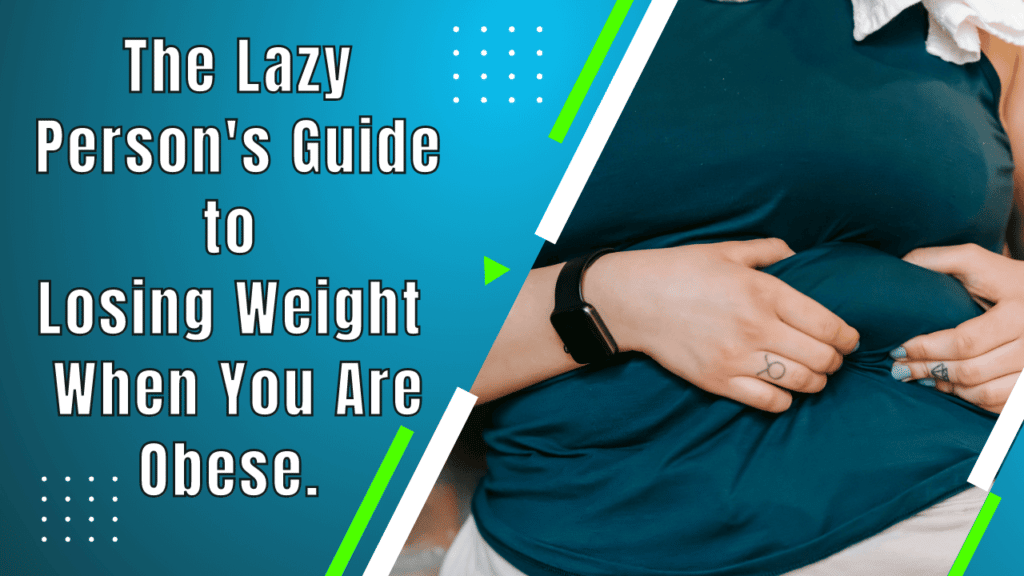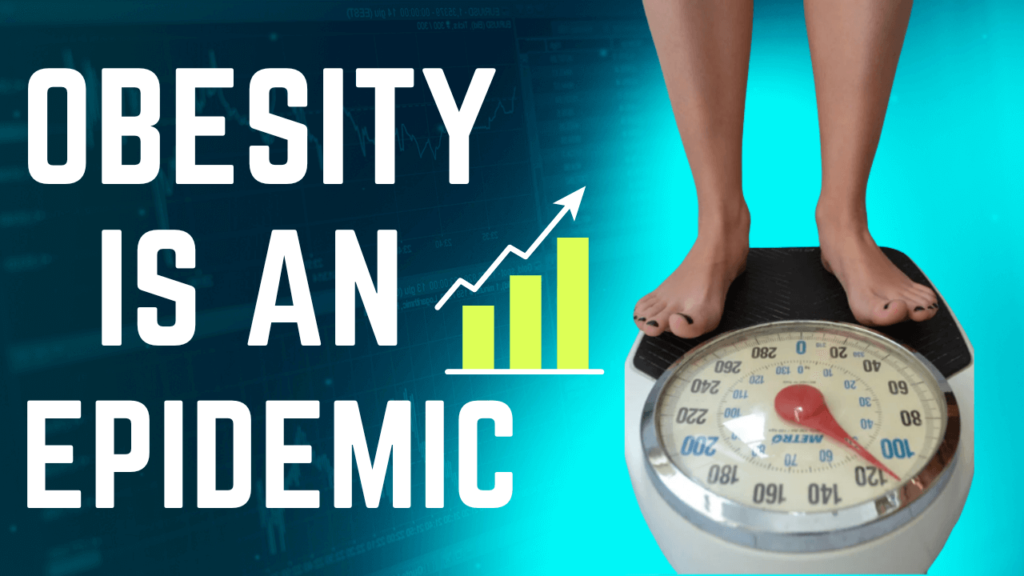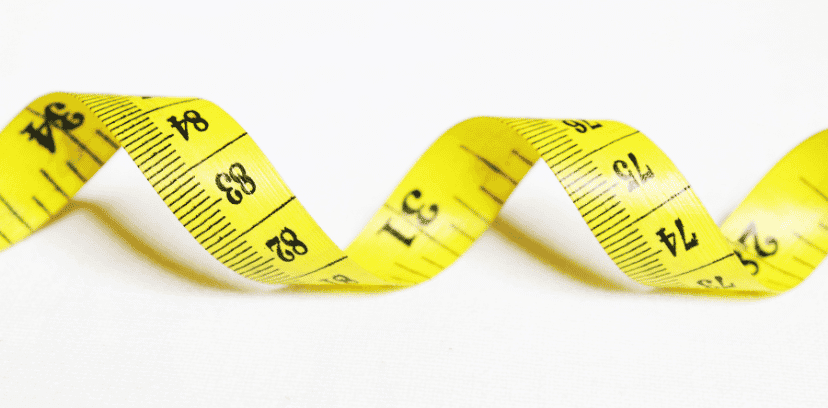The Lazy Person’s Guide to Losing Weight When You Are Obese.

Disclosure: You should be aware that some of the links in this article may be affiliate links, which means that if you decide to buy something through one of these links, I may receive a commission, which does not increase the cost to you. This site does not provide financial or medical advice and is just for entertainment purposes. In our privacy policy, you may see our affiliate disclosure.
There are many people who are obese and want to lose weight. However, it is not easy to do and it can be very frustrating. If you are obese and want to lose weight, you have taken the first step. Congratulations! This article will go over some basic steps that can help with your continued weight loss.
The lazy approach is simply not overdoing it. Take small steps and don’t put unrealistic goals or expectations in place. It we get to where we are on the scale over a period of time, and the problem we run into is that we want to get the weight off overnight.
Having realistic goals and expectations allows you to have fun and enjoy continued success in weight loss and be able to maintain your goal weight. It’s important to make a commitment of the rest of your life to a healthy lifestyle.
No matter who you are, weight goes on or comes off one pound at a time. Remember though, it is not easy, and you will have ups and downs throughout the process of not only losing weight but becoming more healthy and developing a healthy lifestyle.

FREE
Weight Loss eBook
Discover How To Get Rid of Stubborn Belly Fat the Easy Way and Forever.
When you are obese, starting to lose weight can seem like a daunting task. But with some planning and patience, you can start to see results. Start by making small changes to your diet and exercise.
Don’t look at your weight loss journey as giving foods and other things up, look at it as replacing the less unhealthy things with healthy things instead. For example, you are not giving up or cutting out processed foods and sugary drinks, you are replacing them with whole fruits and vegetables.
It is important to consult a physician before starting an exercise and or diet program, especially if one has any health concerns.
Don’t look at your weight loss journey as giving foods and other things up, look at it as replacing the less unhealthy things with healthy things instead.
The obesity epidemic in the United States
The obesity epidemic in the United States is a complex public health issue that has received a great deal of attention in recent years. The causes of obesity are multifactorial and include genetic, environmental, and lifestyle factors.
Obesity can lead to a variety of health problems, including heart disease, stroke, diabetes, and cancer. There are a number of interventions that can help address obesity, including lifestyle changes, medication, and surgery.
There is a great deal of debate surrounding the obesity epidemic in the United States. Some people argue that the epidemic is due to a lack of personal responsibility, while others claim that there are systemic factors at work.
What is undeniable, however, is that obesity rates have been climbing for decades, and now affect more than one-third of the population. There are many contributing factors to obesity, including genetics, lifestyle choices, and environmental factors.

Causes of obesity
There is no one cause of obesity, but rather a variety of factors that contribute to it. These include genetic, environmental, and lifestyle factors. Some people may be more genetically predisposed to gain weight than others, and may find it harder to maintain a healthy weight.
Environmental factors such as a lack of access to healthy food choices or an inactive lifestyle can also contribute to obesity. And finally, lifestyle choices such as eating unhealthy foods and not getting enough exercise are also major contributors.
The obesity epidemic in the United States is a complex public health issue that has received a great deal of attention in recent years. The causes of obesity are multifactorial and include genetic, environmental, and lifestyle factors.
Table of Contents
What is considered morbidly obese?
Morbid obesity is a chronic, progressive disease characterized by excessive body fat that increases the risk of serious health problems, including heart disease, stroke, diabetes, and cancer.
Morbid obesity is diagnosed when someone’s body mass index (BMI) is 40 or higher, or when they have a BMI of 35 or higher, and another health problem related to obesity. Treatment for morbid obesity includes lifestyle changes such as diet and exercise and medications or surgery to help lose weight.
There are a few reasons why morbid obesity should be of concern. First, individuals who are morbidly obese are at an increased risk for developing a number of chronic health conditions, such as heart disease, stroke, diabetes, and cancer.
Second, obesity is associated with a number of social and psychological problems, such as lower self-esteem and depression. Finally, the healthcare costs associated with obesity are high and are likely to continue to increase in the future.
Morbid obesity is diagnosed when someone’s body mass index (BMI) is 40 or higher, or when they have a BMI of 35 or higher, and another health problem related to obesity.
Rapid Weight Loss vs. Slow Weight Loss.
There is a lot of debate surrounding the topic of weight loss, specifically how quickly or slowly the weight should come off.
Some experts argue that rapid weight loss is unhealthy and can actually lead to more weight gain in the long run, while others claim that slow, steady weight loss is the best way to go.
The truth is likely somewhere in the middle – it’s important to find a healthy balance between losing too much weight too quickly and not losing any weight at all.
There are a few advantages to losing weight slowly. Firstly, you are less likely to experience the dreaded “yo-yo effect” where you lose weight quickly, only to put it all back on again.
Secondly, by losing weight slowly, you are more likely to keep the weight off in the long term.
Slow weight loss is usually more sustainable and therefore easier to stick to in the long run. Finally, it is generally healthier to lose weight slowly rather than quickly.

There are a few advantages to losing weight slowly. Firstly, you are less likely to experience the dreaded “yo-yo effect” where you lose weight quickly, only to put it all back on again.

FREE
Weight Loss eBook
Discover How To Get Rid of Stubborn Belly Fat the Easy Way and Forever.
Is it harder to lose weight when you are obese?
There is no easy answer to this question. It is certainly harder to lose weight when you are obese, but it is not impossible. There are a number of factors that contribute to weight loss, including diet and exercise. Some people may find it easier to lose weight than others, depending on their individual metabolism and other factors.
Calorie-burning capacity
People who are overweight or obese lack the calorie-burning capacity necessary to achieve long-term weight loss with exercise alone. In addition, exercising the same amount of time for an overweight person is considerably more difficult than exercising the same amount of time for someone who is not overweight. A patient who is obese will never be able to do enough exercise to lose weight through calorie burning.
Starvation mode
Our bodies will not allow us to reduce our caloric intake to the point where we achieve long-term weight loss. The body’s biochemical responses are focused on survival, and they help the body fight back. For people who restrict calories, the body’s metabolic rate slows down because it perceives this circumstance as an immediate threat to their lives.
Our bodies seek to conserve our fat and energy reserves if the perception is that there is less food available, so we don’t starve to death. When hunger is seen as a real threat, the body releases surges of hunger hormones, resulting in food-seeking behavior.
It is certainly harder to lose weight when you are obese, but it is not impossible. There are a number of factors that contribute to weight loss, including diet and exercise.
How do people who are obese begin to exercise?
There is no one-size-fits-all answer to this question, as the best way to start exercising for obesity depends on the individual’s starting point and fitness level. However, a good place to start for most people would be by gradually incorporating more physical activity into their routine, and then increasing the intensity and duration of their workouts over time. It’s also important to focus on activities that you enjoy so that you’re more likely to stick with them in the long run.
The best approach to starting out exercising
The best approach to exercise if you haven’t exercised in a while is to gradually ease your way back into it. Start by doing some light cardio, like walking or biking, for about 10-15 minutes per day. Once you’re comfortable with that, add in some strength training a few times a week. Be sure to focus on exercises that work for multiple muscle groups so you can get the most out of your time. And finally, don’t forget to stretch!
It is important to not overdo it and take it slow. Remember, long-term sustainability in decreased weight loss and avoiding the Yo-Yo effect is the goal.

The best approach to exercise if you haven’t exercised in a while is to gradually ease your way back into it. Start by doing some light cardio, like walking or biking, for about 10-15 minutes per day.
Do obese people lose weight faster?
There is no clear consensus on whether obese people lose weight faster than those of a healthy weight, as the existing research on the topic is inconclusive. Some studies have found that obese people do lose weight more quickly, while others have found that there is no significant difference between the two groups.
There are a number of potential explanations for these disparities, including differences in the way the studies were conducted, the types of participants involved, and the amount of weight lost.
The scientific community has long been divided on the best way to lose weight—through diet and exercise or by surgery. Some studies have found that obese people do lose weight more quickly when they undergo surgery, while others have found that surgery is not always successful in terms of weight loss.
It is important to note that these studies are ongoing, and more research is needed in order to make any definitive statements about the best way to lose weight.

Some studies have found that obese people do lose weight more quickly, while others have found that there is no significant difference between the two groups.

FREE
Weight Loss eBook
Discover How To Get Rid of Stubborn Belly Fat the Easy Way and Forever.
Is it harder to lose weight when you are obese?
Once again, there is no definitive answer to this question as it depends on a variety of individual factors. However, research indicates that it may be more difficult for obese individuals to lose weight and keep it off than those who are not obese. This is likely due to the fact that obesity is often associated with other health conditions (e.g., type 2 diabetes, high blood pressure) that can make weight loss more challenging.
Weight loss is difficult.
Obesity is a common problem in the United States. More than one-third of American adults are obese, and that number continues to grow. Obesity can lead to a number of health problems, including heart disease, stroke, and diabetes.
Losing weight can be difficult for obese people. Many diets are unsuccessful, and many people regain the weight they lose. There are several reasons why losing weight is difficult for obese people.
Obesity is a disease
Obesity is a disease that causes the body to store excess fat. This makes it hard for obese people to lose weight through diet and exercise alone. Second, obese individuals often have low self-esteem and poor body image. This can make it hard to stick with a diet or exercise program. Third, many obese people have metabolic syndrome, which makes it difficult to lose weight and maintain a healthy weight.
Losing weight can be difficult for obese people. Many diets are unsuccessful, and many people regain the weight they lose. There are several reasons why losing weight is difficult for obese people.

Helpful weight loss tips.
There are many helpful tips for weight loss that can be found in academic journals and other research-based publications. One important factor to consider is the role of genetics in weight loss and weight gain.
Some people may find it easier to lose weight than others, due to their genes. However, there are many other factors that contribute to weight loss, such as diet, physical activity, and sleep.
While it may be more difficult for a person who is obese to lose weight, it is not impossible and will take time and patience.
Eat varied nutritional and colorful foods.
The phrase “eat varied nutritional and colorful foods” can be broken down into a few simple concepts. Eating a variety of foods is important because it provides the body with a range of essential nutrients. Eating colorful foods is also important, as they are typically high in antioxidants which can help protect the body from disease. By following these simple tips, individuals can improve their overall health and well-being.
Be your best encouragement.
This statement encourages someone to be their best self and achieve great things. The phrase “be your best encouragement” means to be a motivator, someone who inspires someone else to do their best. In this case, it is you.
This is important because it can help someone achieve their goals and feel good about themselves.
Don’t be concerned about weight loss plateaus, work through them.
If you’re working hard to lose weight and hit a plateau, don’t worry – you’re not alone. Nearly everyone experiences them at some point, and they can be frustrating. But don’t give up! Work through the plateau by adjusting your diet and exercise routine until you start seeing results again. Drink plenty of water, eat plenty of fruits and vegetables, and get moving. And if you still need help, talk to your doctor or a nutritionist for advice.
Keep a photo diary of your weight loss journey.
In essence, by keeping a photo diary of your weight loss journey, you will be able to track your progress and see the positive changes that have occurred as a result of your hard work. This can be an immensely motivating tool, as it allows you to visually celebrate your accomplishments. Additionally, it can be helpful to look back on your photos when you are feeling discouraged, as it can remind you of all that you have achieved.
The phrase “be your best encouragement” means to be a motivator, someone who inspires someone else to do their best. In this case, it is you.
See your doctor.
This point cannot be stated and encouraged enough. If you are experiencing any health concerns that could impede your weight loss efforts, it is important to seek medical attention from a doctor.
By doing so, you can develop a plan to address these concerns and continue on your journey to reach your goals. Remember, it is always best to be proactive when it comes to your health, and seeking guidance from a professional is the best way to ensure success.
Focus on a healthy lifestyle, not weight loss.
Be active and exercise regularly.
Walking
Walking is the best exercise for most people. Walking is readily available practically anywhere. You don’t need special equipment. A good pair of shoes but that’s about it. Walking promotes lower body strength and mobility and can be mild, moderate, or intense.
Not everyone enjoys walking. If you have knee, back, or hip pain, consult a doctor. You can work with a physical therapist or exercise specialist to treat the issue or improve your fitness routine.
If you experience any pain at all this is your body telling you to slow down. Knee, back, and hip pain is not the same as muscle toning and building soreness.
Start by walking 10 or 15 minutes a day if you’re a beginner. Build up to a 30-minute session. Speed and pace aren’t important at first. Be consistent. As your fitness improves, try increasing your training speed and intensity. Remember to listen to your body.
The phrase “be your best encouragement” means to be a motivator, someone who inspires someone else to do their best. In this case, it is you.
Focus on a healthy lifestyle, not weight loss.
When it comes to health, many people focus on weight loss. However, this is not the only marker of good health. In fact, focusing on weight loss can actually be detrimental to your health.
A better approach is to focus on leading a healthy lifestyle. This includes eating healthy foods, getting regular exercise, and getting enough sleep. By focusing on these things, you will not only lose weight, but you will also be healthier overall.
There are a few things to consider when it comes to weight loss and your health. For one, weight loss can actually be detrimental to your health if done improperly or too quickly. When you lose weight, particularly a lot of weight, your body goes into a state of shock. This can lead to a number of health problems, including an increased risk for heart attack and stroke.
There are many benefits to leading a healthy lifestyle. Exercise releases endorphins, which can make you feel happy and improve your mood. Eating healthy foods can help you maintain a healthy weight, reduce your risk of developing chronic diseases, and give you more energy.
Getting enough sleep is important for your health and can help improve your mood and cognitive function. Practicing stress-relieving activities can help you manage stress and improve your overall well-being.
A better approach is to focus on leading a healthy lifestyle. This includes eating healthy foods, getting regular exercise, and getting enough sleep. By focusing on these things, you will not only lose weight, but you will also be healthier overall.

Summary
It is certainly harder to lose weight when you are obese, but it is not impossible. There are many ways to lose weight, and there is no one right way for everyone. If you are struggling to lose weight, don’t give up- seek out help from a professional, or find a support group to help you stay motivated. With time and effort, you can lose weight and improve your health.
By making small changes to your diet and exercise, you can start to see results. Remember to be patient, it may take some time for the weight to start coming off. Make sure to stay motivated and focused on your goals. Good luck on your journey!
Don’t think of your journey to a healthier lifestyle as depriving yourself of the foods you love. Instead, think of it as replacing the unhealthy things in your diet with healthier alternatives. Making small changes over time will add up to big results, and eventually, you’ll find that you not only feel better, but also look great! So get started today and you’ll be on your way to a healthier, happier you in no time.


FREE
Weight Loss eBook
Discover How To Get Rid of Stubborn Belly Fat the Easy Way and Forever.
Disclosure: You should be aware that some of the links in this article may be affiliate links, which means that if you decide to buy something through one of these links, I may receive a commission, which does not increase the cost to you. This site does not provide financial or medical advice and is just for entertainment purposes. In our privacy policy, you may see our affiliate disclosure..













